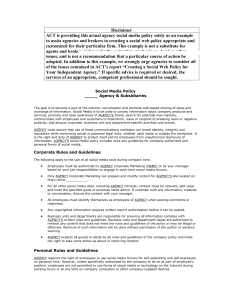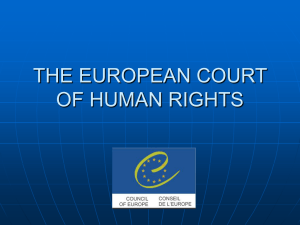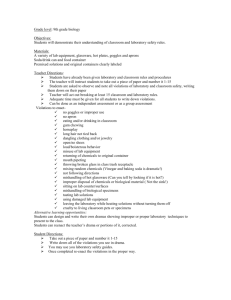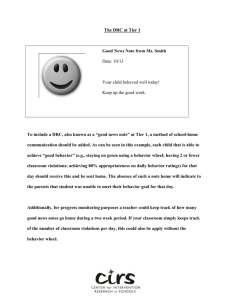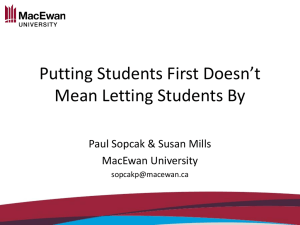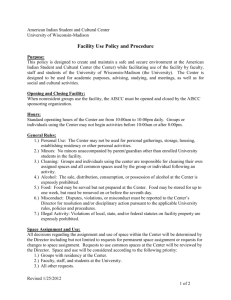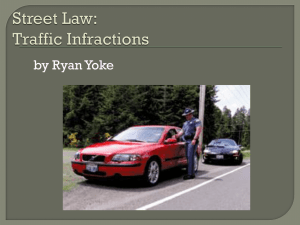The measurement of gross human rights violations in Indonesia
advertisement
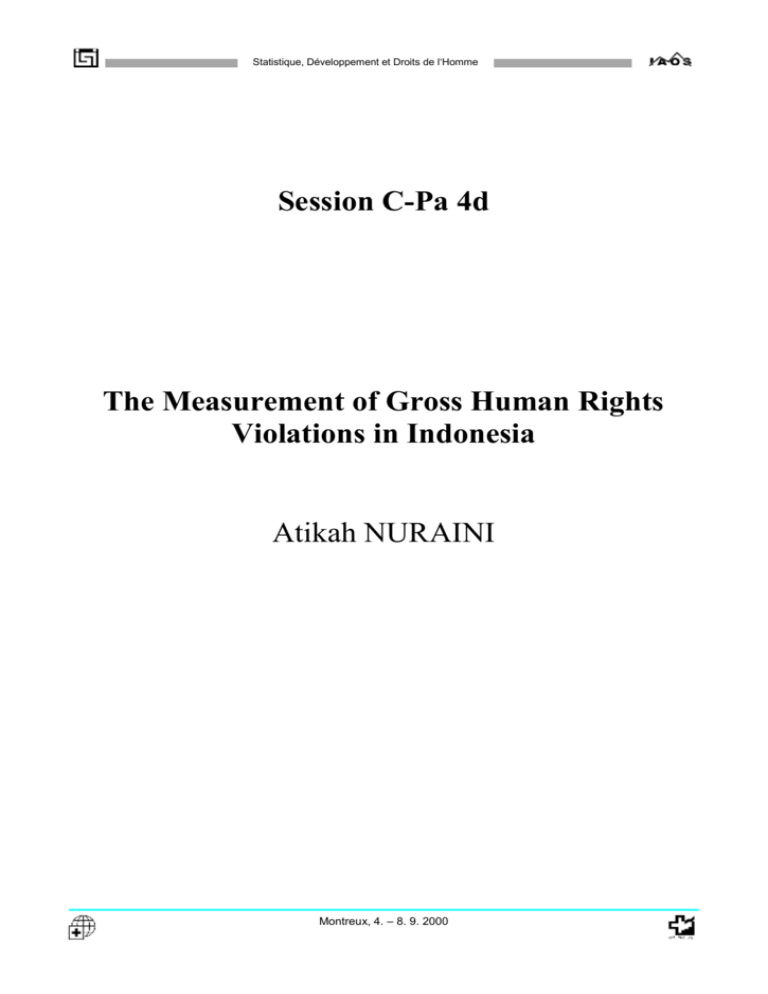
Statistique, Développement et Droits de l‘Homme Session C-Pa 4d The Measurement of Gross Human Rights Violations in Indonesia Atikah NURAINI Montreux, 4. – 8. 9. 2000 Statistique, Développement et Droits de l‘Homme The Measurement of Gross Human Rights Violations in Indonesia Atikah NURAINI Information and Documentation Bureau, Indonesian National Commission of Human Rights Jl. Latuharhary No 4B Menteng Jakarta 10310, Indonesia T. + 62 21 392 5230 F. + 62 21 392 5227 atikah@kamlive.com ABSTRACT The Measurement of Gross Human Rights Violations in Indonesia The situation in Indonesia has reflected a complete social, political and economic instability and the new government should seize the opportunity to embark into appropriate continue reforms and to recover from the conflict. At the same time Indonesia is in the process to rebuild good governance which is condition sine qua non for economic recovery. Good governance must facilitate law enforcement, impartial judiciary system and transparency in the processes of public policies making. Recent experiences in transition from dictatorship to democracy in Indonesia have caused a rapid awareness of national human rights issues and principles. Although, the new government has enacted the national bill of rights and strengthened the position of national human rights institutions, in reality, Indonesians must confront the problem of what to do with the legacy of massive and systematic human rights violations in the past. One of the precepts suggests that when massive and systematic violations of the most fundamental rights occur, the state is obliged to investigate, prosecute, and punish those responsible. Similarly, the state is obliged to reveal to the victims and society everything known about the facts and circumstances of such violations. The paper touches upon the indicators corresponding to the criteria and measurement of gross human rights violations that occurred during new order regime and the transition period based on International Covenant on Civil and Political Rights (ICCPR). The four cases reviewed are East Timor, Aceh, Moluccas (which were known as the hottest spots provinces) and the incidents of Tanjung Priok (1984). Those cases were handled by the National Commission on Human Rights (Komnas HAM) as a national human rights institution supported by some national and local nongovernmental organization. Dealing with the measurement of violations, the paper deals with the methodology of data collection and the errors that enter the process in terms of technical and political constraints. I will also review the limited evidence on the reliability and validity of civil and political rights in the national legislation since this Covenant is not ratified yet. RESUME La mesure des violations massives des droits de l’homme en Indonésie La situation en Indonésie s‘est caractérisée par une instabilité totale au point de vue social, politique et économique, et le nouveau gouvernement devrait saisir l'occasion pour adopter des 2 Montreux, 4. – 8. 9. 2000 Statistique, Développement et Droits de l‘Homme réformes appropriées et continues, et remédier aux conflits. Par ailleurs, un processus d'assainissement des procédures gouvernementales est en cours, car sans bonne gouvernance il n'y aura pas de rétablissement économique. La bonne gouvernance doit faire respecter les lois, garantir l'impartialité du système judiciaire et assurer la transparence des processus de définition des politiques publiques. Les récentes expériences en matière de transition de la dictature à la démocratie ont rapidement engendré la conscience des droits de la personne et des principes correspondants. Bien que le nouveau gouvernement ait publié une charte des droits humains et consolidé la position des organismes de protection de ceux-ci, en fait les Indonésiens doivent affronter les problèmes légués par les violations massives et systématiques des droits de la personne commises dans le passé. Selon l'une des règles à observer, quand ont lieu des violations massives et systématiques des droits les plus élémentaires, l'Etat est tenu d'enquêter et de poursuivre et punir les responsables. De même, il est tenu de révéler aux victimes et à la société tout ce qu'il sait sur les faits et circonstances de ces violations. L'article traite des indicateurs et critères employés pour l'évaluation des violations massives des droits de la personne commises pendant le régime de l'Ordre Nouveau, ainsi que pendant la période de transition, selon les normes du Pacte international sur les droits civils et politiques (CIDCP). Les quatre cas examinés concernent le Timor oriental, Atjeh et les Moluques (les provinces les plus affectées), ainsi que les incidents de Tanjung Priok (1984). Ces cas ont été examinés par la Commission nationale des droits de la personne (Komnas HAM), institution spécialisée appuyée par certaines organisations non gouvernementales tant nationales que locales. A propos de la mesure des violations, l'article traite de la méthodologie de collecte des données et des erreurs intervenant dans le processus suite à des limites d'ordre technique et politique. Je mentionne également le caractère limité de la fiabilité et de la validité des mesures prévues par la législation nationale en matière de droits civils et politiques, car le Pacte n'a toujours pas été ratifié. 1. Introduction The situation in Indonesia has reflected a completely social, political and economic instability and the new government should seize the opportunity to embark appropriate continues reforms and to recover the conflict. At the same time Indonesia is in the process to rebuild good governance which is condition sine qua non for economic recovery. Good governance must facilitate law enforcement, impartial judiciary system and transparency in the processes of public policies making. Recent experiences in transition from dictatorship to democracy in Indonesia have caused a rapid awareness of national human rights issue and principles. Although, the new government has enacted the national bill of rights and strengthen the position of national human rights institution, in reality, Indonesians must confront the problem of what to do with the legacy of massive and systematic human rights violations in the past. One of the precepts suggest that when massive and systematic violations of the most fundamental rights occur, the state is obliged to investigate, prosecute, and punish those responsible. Similarly, the state is obliged to reveal to the victims and society everything known about the facts and circumstances of such violations. The paper touch upon the indicators corresponds to the criteria and measurement of gross human rights violations that occurred during new order regime and the transition period based on International Covenant on Civil and Political Rights (ICCPR) dealing with the experience of National Human Rights Commission in Indonesia. 2. Indonesia's National Commission on Human Rights The National Human Rights Commission in Indonesia was established in late 1993 through a presidential order (Presidential Decree Number 50, 1993). It is composed of 25 commissioners 3 Montreux, 4. – 8. 9. 2000 Statistique, Développement et Droits de l‘Homme who serve a five-year term (with one reappointment). There is a Plenary Commission composed of all the commissioners, which decides on the rules of procedure of the whole commission and approves its program of activities. The commissioners are the assigned to the three subcommissions that concentrate on the following: Education and Dissemination of Human Rights; Examination of Human Rights Instruments; Monitoring of Human Rights Implementation. The formation of the Commission comes at a time when the government of Indonesia has come under increasing pressure to improve its human rights record. Serious human rights violation by the Indonesia government have been well documented and include extra judicial killings, tortures, unfair political trials and severe restrictions on the rights to freedom of expression, assembly and association. The presidential Decree sets up a National Commission to promote adherence to human rights in Indonesia, consistent with the state doctrine of Pancasila (Five Principles) 1, the 1945 Constitution and the Universal Declaration on Human Rights. The Commission has the following functions: a. Disseminate information on the national and international perspectives on human rights society and the international community b. Provide advice to the government on accession to or ratification of the United Nations human rights instruments c. Monitor and provide advice on the implementation of human rights instruments by State agencies d. Investigate human rights violations and express opinions and suggestions to appropriate government agencies e. Foster international cooperation on human rights promotion and protection. The Commission started an open dialogue with various government agencies such as the Coordinating Ministry of Politics and Security, Headquarters of the Armed Forces, Ministry of Labor, The Supreme Advisory Council, and the National Center for the Implementation of Pancasila. The Commission has received an average of more than two thousand letter-complaints per year. There are also complaints orally received by the Commission from people who visits its office. The letter-complaints mainly deal with land, labor, law enforcement, housing and religious issues. Land and labor cases comprise the most number of the complaints while complaints against members of law enforcement agencies follow next. The complaints after investigation are handled in either of two ways: a. Referral of the case to the government agency concerned with an appropriate recommendation on how to resolve the issue b. Direct arbitration and mediation between the parties involved. According to the UN Principles relating to the Status of National Institutions for the Promotion and Protection of Human Rights, known as the Paris Principles, a human rights commission can play an important role in promoting and protecting human rights. To be effective, however, a human rights commission must be: a. Independent of government control b. Have a clear mandate to investigate a wide range of human rights violations c. Be composed of competent and impartial individuals not beholden to the government d. Be sufficiently funded in a manner that does not reduce their independence e. Have sufficient powers and expertise to investigate allegations of human rights violations, take remedial action and induce the government to respond appropriately to alleged violations 1 The five principles of Pancasila are Belief in one Supreme God; Justice and civility among peoples; The Unity of Indonesia; Democracy through deliberation and consensus among Representatives; Social Justice for all. 4 Montreux, 4. – 8. 9. 2000 Statistique, Développement et Droits de l‘Homme The power conferred on the Komnas HAM under presidential decree is minimal. Nowhere does the decree specifically empower the commission to conduct investigations of alleged violations of human rights or provide special powers that would assist in such investigations. Komnas HAM not specifically empowered to hear and consider complaints, subpoena witnesses or documents, file information with the courts, visit jail and prisons, or second police or military investigators to provide technical expertise in investigations. Komnas HAM also not been given power to take affirmative action on behalf of victims of human rights violations, such as by providing interim relief or a witness protection program. This absent of powers is the strongest obstacle for Komnas HAM to enforce human rights in Indonesia. 3. A Brief Human Rights Situation in Indonesia The dominant feature of the 1945 Constitution of Indonesia was the 5 principles of Pancasila. Pancasila did not ignore human rights, but allowed that freedoms it contained...”be regulated by law”. As a result, human rights and their protection (along with the powers of the executive, the legislature and judiciary) were subordinated to national imperative as of social harmony and economic development – and the overriding powers of the president. There was a classic argument that human rights were too costly for a newly emerging state, which had still to confront an unintegrated country and economic backwards. By the terms of this argument, in the name of unity and nation building, human rights had necessarily to be put aside.2 The 32 years of Soeharto’s New Order regime have brought political stability and economic growth to Indonesia. This has not, however, been achieved without the use of “unfriendly” human rights practices by the government to eliminate political dissent and to maintain social order. Some of glaring instances of human rights violations during Soeharto’s regime include the killing of about 100 protesters in Tanjung Priok in 1984, the arbitrary execution of thousands suspected criminals in the Petrus Campaign, the shooting of more than 200 East Timorese in Dili 14 January 1991 which was known as Santa Cruz massacre, the suppression of dissent in Aceh during 1989-1998, the banning of media, academics, human rights activists, opposition politicians, religious leaders and literary figures, etc. The last couple years, although political reforms began, serious human rights violations still continued. At least 358 prisoners of conscience were detained. Hundreds of people were briefly detained without charge or trial. Torture and “disappearances” continued. The security forces in suspicious circumstances have killed dozens of people. Previous cases of “disappearances” and extra-judicial executions remained unresolved. In March President Soeharto was re-elected for a seventh consecutive term after elections in which he was the only candidate. Widespread protest against the re-election and disquiet over the economic crisis culminated in demonstrations by thousands of students in the capital, Jakarta. In May, four university students were unlawfully killed by the military in Jakarta. On 21 May President Soeharto resigned and his deputy, B.J. Habibie, became President, promising political and economic reforms. In November new laws covering elections, parliament and the formation of political parties were approved in principle and dates were set for parliamentary and presidential elections in 1999. In April 1998, The UN Commission on Human Rights made a statement criticizing Indonesia's lack of implementation of recommendations contained in previous statements and resolutions from the Commission. The statement, which was accepted by the Commission's member states, also noted Indonesia's invitation to the UN Working Group on Arbitrary Detention to visit East Timor before the next session of the Commission. Todung Mulya Lubis, In Search of Human Rights: Legal-Political Dilemmas of Indonesia’s New Order, 1966-1990, Jakarta: Gramedia, 1993, p.74 5 2 Montreux, 4. – 8. 9. 2000 Statistique, Développement et Droits de l‘Homme In May the government ratified the ILO Convention No. 87 concerning Freedom of Association and Protection of the Right to Organize. In June the government announced a National Plan of Action on Human Rights, committing Indonesia to ratify major human rights treaties over a five-year period. In October Indonesia ratified the UN Convention against Torture and Other Cruel, Inhuman or Degrading Treatment or Punishment. 3 In Aceh over several years of counter-insurgency operations by the armed forces, concluding that at least 700 people had been unlawfully killed by the military.4 Dealing with the political prisoners, at least 179 Indonesian and East Timorese political prisoners, including prisoners of conscience, were released, had charges against them dropped or parole restrictions lifted in a program ordered by the President Habibie. However, during 1998 hundreds of people were subjected to short-term arbitrary detention. In East Timor, at least 64 people were arbitrarily detained by the military in July for alleged links to armed opposition groups, despite the fact that the military has no legal authority to conduct arrests. Torture, ill treatment, and enforced disappearances continued to be reported throughout Indonesia and East Timor during the year. By the end of the year, the whereabouts of 13 political activists remained unknown. Five had “disappeared” in 1998, eight “disappeared” during the political crisis in early 1998, who were taken into military custody in February and March. In East Timor, at least eight people and possibly as many as 32 “disappeared” after being arrested by the security forces. 4. Gross Human Rights Violations: Theoretical Framework The gross violations of human rights, particularly but not exclusively relating to genocide, torture, disappearances, summary and arbitrary executions, arbitrary and prolonged detention, slavery and slave-like practices and systematic discrimination when left unaddressed result in a culture of impunity, which is one of the most serious obstacles to a transition to democracy.5 According to Theodoor Van Boven, if we read again the Preamble of UN Charter, the theory of humanitarian intervention consider to large-scale violation of very elementary rights under certain conditions a legitimate ground for armed intervention. This is that part of human rights law which does not permit any derogation even in time of armed conflict or in other public emergency situations threatening the life of the Nation. For example, the Article 3 of the Four Geneva Conventions of 1949, setting out a number of minimum humanitarian standards which are to be respected in cases of conflict, which are not of an international character, enumerates certain acts which “are and shall remain prohibited at any time and in any place whatsoever.” 6 The universal validity of these fundamental prescriptions is underlined by the words “at any time and any place whatsoever” in this common article of the four 1949 Geneva Conventions.7 The clear definition of fundamental rights which often connecting gross violations of human rights also can be found at the International Covenant on Civil and Political Rights. This Covenant 3 The Indonesian National Commission on Human Rights, Annual Report, 1998 The Indonesian National Commission on Human Rights, Annual Report, 1998 5 Iris Almeida, "Compensation and Reparation for Gross Violations of Human Rights: Advancing International Discourse and Action", Conference Paper on Reining in Impunity for International Crimes and Serious Violations of Fundamental Human Rights, Italy: International Institute of Higher Studies in Criminal Sciences, 1997. 6 The Acts are mentioned: “a) violence to life and person, in particular, murder of all kinds, mutilation, cruel treatment and torture; b) taking of hostages; c) outrages upon personal dignity, in particular, humiliating and degrading treatment; d) the passing of sentences and the carrying out of executions without previous judgment pronounced by a regularly constituted court, affording all the judicial guarantees which are recognized as indispensable by civilized nations.” 7 Theodoor Van Boven, in The International Dimensions of Human Rights, edited by Karel Vasak, Vol.I, Paris: Unesco, 1982, p.45 6 4 Montreux, 4. – 8. 9. 2000 Statistique, Développement et Droits de l‘Homme enumerates at article 4, para.2, "the rights from which no derogation is allowed in time of public emergency."8 5. The Measurement of Violation: Needs and Obstacles There is a great need for scientific methods of quantitative analysis in the presentation and preparation of human rights report. What Komnas HAM is doing for handling gross human rights violations is establishing an ad hoc committee for each outstanding cases, such as East Timor, Tanjung Priok or Aceh. However, the problem of documentation always happens in terms of collecting, organizing, analyzing and reporting data, since Komnas HAM has not have any fixed system for its documentation and still consider some appropriate system for different cases. For example, on East Timor case Komnas HAM has a collaboration with HURIDOCS and is using this system to document the victims and events happened in East Timor before they come up with the conclusion for the perpetrators and asking for government responsibility. Before using HURIDOCS for its system, the documentation was done manually and Komnas HAM faced some difficulties in terms of accuracy, authenticity and consistency as well. The needs for measurement of gross human rights violations for Komnas HAM are: a. The standard rule that all representation of the victim must not be separated from the information about who committed the violation, when and where it happened. The connection must be made at the level of the violation (the act), because any other level leaves open the possibility of confusing who did what to whom. b. Security and authenticity are crucial problems for Komnas HAM. Basically, both problems are solvable but Komnas HAM must be willing to be disciplined and they must develop security routines and use them for all of their correspondence. c. Patterns of violation of human rights will be useful to identify the perpetrators or groups of victims. Many for of pattern can have utility. A rise in violation when a particular individual or group is active in a region, a disproportionate level; of violations in a particular region or among members of a particular ethnic group, a consistent mode of behavior and many other patterns can be useful in targeting perpetrator suggesting sources of violations. However, statistical evidence of a pattern is not proof of a causal relationship. d. Lastly, even incomplete and distorted data can still provide evidence of human rights violations when the data are properly analyzed. Examples of inferences from incomplete and distorted data using data availability, mortality statistics, burial time series, health statistics, economic data and event reports in a number of cases have been given are valuable data can be used by Komnas HAM to strengthen the field data. 6. Next Problem? Indonesia is a country with a problem of law enforcement. Even though many parties now have the courage to open all the tendencies towards misuse of power by the authorities and Komnas HAM committed to human rights implementation, several problems would happen dealing with unclear and uncertain legal process, especially to give a proper punishment and compensate the victims. 8 The right to life (article 6), the right not to be subjected to torture or to cruel, inhuman or degrading treatment or punishment (article 7), the right not to be held in slavery or servitude (article 8 paras.1and 2), the right not to be imprisoned merely on the ground of inability to fulfill a contractual obligation (article 11), the prohibition to retroactive application of criminal law (article 15), the right to recognition everywhere as a person before the law (article 16) and the right to freedom of thought, conscience and religion (article 18). Regional human rights conventions contain a similar clause enumerating provisions from which no derogation maybe made. 8 7 Montreux, 4. – 8. 9. 2000 Statistique, Développement et Droits de l‘Homme One of the problems that lead to incomplete law enforcement in various cases of misuse of power is that there is no procedural mechanism to urge an investigation into the problem. A police investigation of a suspected crime carried out by a legislator is instigated according to Law No. 13/1970. For a judicial official, there is also a formal rule regulating the instigation of an investigation. From a Supreme Judge to the Chief justice, they can be caught or arrested on the orders of the Attorney General with permission from the president. If an arrest order is followed by an arrest, a Supreme Court judge has to resign temporarily from his position (Law No. 14 / 1985). His resignation comes on the orders of the president and is suggested by the Chief Justice. Meanwhile, judges of other courts can be caught and arrested on the orders of the Attorney General with permission from The Chief Justice and Minister of Law and Legislation (Law No. 2 / 1986). There is also a big question in terms of criminal procedures being taken against the executive and the political punishments if the crime is proved. Until now, there are no laws regarding a procedure to investigate the president or his ministers. In fact, there are no laws regarding the executive at all. As I mentioned earlier, the problem of human rights violations always connects to the issue of impunity. REFERENCES Almeida, Iris, "Compensation and Reparation for Gross Violations of Human Rights: Advancing International Discourse and Action", Conference Paper on Reining in Impunity for International Crimes and Serious Violations of Fundamental Human Rights, Italy: International Institute of Higher Studies in Criminal Sciences, 1997 Ball, Patrick, Who Did What to Whom: Planning and Implementing a Large Scale Human Rights Data Project, Washington: AAAS, 1996 van Boven, Theodoor, in The International Dimensions of Human Rights, edited by Karel Vasak, Vol.I, Paris: Unesco, 1982, p.45 The Indonesian National Commission on Human Rights, Annual Report 1994-1998, Jakarta: Komnas HAM, 1994-1998 Lubis, Todung Mulya, In Search of Human Rights: Legal-Political Dilemmas of Indonesia’s New Order, 1966-1990, Jakarta: Gramedia, 1993, p.74 The United Nations, A Compilation of International Instruments, Geneva: UN, 1988 8 Montreux, 4. – 8. 9. 2000

